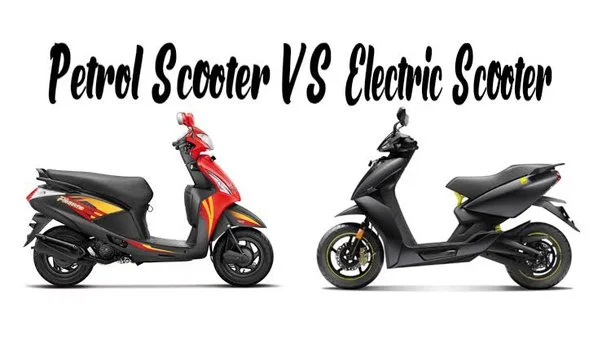Electric Scooters vs Petrol Scooters : In recent years, the global surge in petrol prices has led to an unprecedented increase in the cost of commuting and riding activities. This upward trend is expected to continue, posing financial challenges for individuals relying on petrol-powered vehicles. However, amidst this scenario, electric scooters emerge as a viable and cost-effective alternative for daily commute and recreational riding.

Pricing Dynamics: Electric Scooters vs Petrol Scooters
When considering the initial purchase price, electric scooters historically carried a higher price tag compared to their petrol counterparts. Nevertheless, the landscape has shifted significantly in recent times. Various factors have contributed to the reduction in the price of electric scooters:
- Government Subsidies: Many state governments offer special subsidies for electric vehicles, including scooters, incentivizing their purchase.
- Local Sourcing: Manufacturers are increasingly sourcing components from local vendors, reducing production costs.
- Battery Technology: Advances in battery technology have led to a decrease in manufacturing costs, making electric scooters more affordable.
While entry-level electric scooter models cater to short city drives with limited range, they offer a cost-effective solution for urban commuting. Despite the initial investment, the lower running costs of electric scooters translate into significant savings over time, offsetting the higher upfront expense.
Electric Scooters vs Petrol Scooters Fuel Cost Efficiency: A Clear Advantage for Electric Scooters
In the realm of fuel costs, electric scooters undeniably hold the upper hand over petrol scooters. Electric vehicles require only battery charging, which incurs significantly lower expenses compared to conventional petrol refueling. The cost per kilometer for running an electric scooter is less than half that of a petrol scooter, resulting in substantial long-term savings for the owner.
However, challenges such as the limited availability of public charging stations persist, particularly for individuals traveling long distances or across city boundaries. Despite these obstacles, the economic advantage of electric scooters remains pronounced, especially as petrol prices continue to escalate at a rapid pace.

FAQs: Electric Scooters vs Petrol Scooters Operational Range: Balancing Convenience with Mileage
The operational range of a scooter plays a crucial role in determining its suitability for daily use. Electric scooters typically offer a dynamic range of 50-100 kilometers on a single charge, making them ideal for urban commutes and short-distance travel. However, the need for recharging presents a logistical challenge, especially for individuals with extensive daily travel requirements.
In contrast, petrol scooters boast a longer operational range and can be refueled quickly at any petrol station. For individuals with high daily mileage needs exceeding 70-80 kilometers, petrol scooters may currently offer a more practical solution. Nevertheless, as battery technology advances and electric scooters achieve longer ranges, their appeal as a primary mode of transportation is expected to grow.
Maintenance Considerations: Electric vs Petrol Scooters
Maintenance requirements constitute a significant aspect of scooter ownership, influencing long-term costs and overall convenience. Electric scooters, characterized by their simplicity and efficiency, demand minimal maintenance beyond regular battery charging and routine cleaning.
On the other hand, petrol scooters necessitate periodic servicing, including oil changes, lubrication, and mechanical adjustments. Neglecting these maintenance tasks can adversely affect the performance and longevity of the vehicle, resulting in higher repair expenses over time.

Electric Scooters vs Petrol Scooters Convenience and Accessibility
In terms of convenience, petrol scooters hold an advantage due to the widespread availability of petrol stations and the ease of refueling. However, the emergence of removable batteries in electric scooters has streamlined the charging process, offering greater flexibility to users, particularly those residing in urban areas.
Furthermore, electric scooters boast additional features such as ample storage space and zero emissions, contributing to a more environmentally friendly and enjoyable riding experience. Additionally, many electric scooters offer superior acceleration and maneuverability, enhancing their appeal in congested urban environments.
Conclusion: Making an Informed Choice Electric Scooters vs Petrol Scooters
In conclusion, the debate between electric scooters and petrol scooters hinges on various factors, including pricing, fuel efficiency, operational range, maintenance requirements, and user convenience. While both options have their respective advantages and drawbacks, electric scooters emerge as a compelling choice for individuals seeking cost-effective and environmentally friendly transportation solutions.
In essence, the transition to electric scooters not only aligns with global efforts to reduce carbon emissions but also offers tangible benefits in terms of cost savings and operational efficiency. As petrol prices continue to escalate, embracing electric mobility presents a viable path towards a sustainable future.
READ MORE: Advantages of Using an Electric Scooter for Daily Transportation
READ MORE: Top Career Opportunities in Electric Vehicles Industries
FAQs: Electric Scooters vs Petrol Scooters
- Why have the prices of electric scooters reduced compared to petrol scooters?
- The reduction in the prices of electric scooters can be attributed to various factors such as government subsidies, localization of manufacturing, and decreasing battery costs. Additionally, many brands now offer entry-level electric scooter models designed for short city commutes at lower price points.
- Which type of scooter is more cost-effective in terms of fuel expenses?
- Electric scooters are generally more cost-effective in the long run as they require only battery charging, which is significantly cheaper than petrol. Despite challenges such as limited public charging infrastructure, electric scooters offer considerable savings on fuel costs over time, especially considering the rising prices of petrol.
- What is the operational range difference between electric and petrol scooters?
- Electric scooters typically have a range of 50-100 km, whereas petrol scooters offer longer ranges. Electric scooters are suitable for short city commutes of around 60 km or less per day, while petrol scooters are more suitable for longer distances exceeding 70-80 km daily.
- How does maintenance differ between electric and petrol scooters?
- Electric scooters require minimal maintenance, primarily involving battery charging and basic safety checks. In contrast, petrol scooters require regular maintenance such as oil changes, greasing, and mechanical servicing. Neglecting maintenance for petrol scooters can lead to performance issues.
- What are the charging and convenience considerations for electric scooters?
- Charging an electric scooter typically takes 2-3 hours, which may pose challenges for apartment dwellers without access to dedicated charging stations. However, some electric scooters feature removable batteries for easier charging. While fuelling a petrol scooter at gas stations is more convenient, electric scooters offer advantages such as more boot space, no emissions, and superior acceleration.
- Which type of scooter is better overall?
- The choice between electric and petrol scooters depends on individual preferences and usage patterns. Electric scooters offer long-term cost savings and environmental benefits, while petrol scooters provide convenience and longer operational ranges. Consider factors such as daily commuting distance, charging infrastructure availability, and maintenance preferences when deciding between the two.
